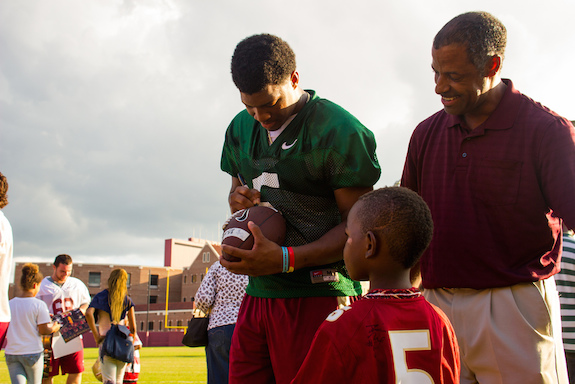
The New York Times reports officials improperly investigated rape allegations against FSU’s quarterback, Jameis Winston. (Photo via the Second Judicial Circuit Guardian ad Litem Program)
By Ashley Lopez
Florida Center for Investigative Reporting
This week, The New York Times published its investigation into how local law enforcement and university officials failed to properly investigate an alleged rape case involving Florida State University’s quarterback, Jameis Winston.
In December 2012, a freshman at FSU accused Winston of sexual assaulting her off-campus after meeting at a popular area bar called Potbelly’s. Records show there was evidence the young woman had been assaulted, but prosecutors were unable to charge Winston.
According to the Times:
Three weeks after Mr. Winston was publicly identified as the suspect, the storm had passed. The local prosecutor announced that he lacked the evidence to charge Mr. Winston with rape. The quarterback would go on to win the Heisman Trophy and lead Florida State to the national championship.
In his announcement, the prosecutor, William N. Meggs, acknowledged a number of shortcomings in the police investigation. In fact, an examination by The New York Times has found that there was virtually no investigation at all, either by the police or the university.
The police did not follow the obvious leads that would have quickly identified the suspect as well as witnesses, one of whom videotaped part of the sexual encounter. After the accuser identified Mr. Winston as her assailant, the police did not even attempt to interview him for nearly two weeks and never obtained his DNA.
The detective handling the case waited two months to write his first report and then prematurely suspended his inquiry without informing the accuser. By the time the prosecutor got the case, important evidence had disappeared, including the video of the sexual act.
“They just missed all the basic fundamental stuff that you are supposed to do,” Mr. Meggs said in a recent interview. Even so, he cautioned, a better investigation might have yielded the same result.
The Times’ investigation relied on local police and university records, interviews with people close to the case, attorneys and sexual assault experts.
The Tampa Bay Times, Tallahassee Democrat and others had reported on the case previously. The New York Times story built on the earlier reporting to more thoroughly examine how officials responded to the allegations.
According to the paper, “Florida State did little to determine what had happened” that night back in 2012.
Furthermore, the Times reports that the local police officer in charge of handling the case, Scott Angulo, had connections to the football franchise and did not look into some of the many leads in the case—including details from the accuser’s testimony where she said she met three men at the bar that night, one them was a football player named Chris and that all four took a taxi home that night.
According to the Times, Angulo didn’t ask for tape from the bar’s 30 surveillance cameras. He didn’t ask the school’s athletic department to help him find Chris—who it turns out had a video of what happened that night, but erased it by the time the cops learned about it.
And neither Angulo nor the prosecutor’s office subpoenaed the phone records of the three men who were with the accuser and Winston that night — even though they investigated all electronic communications to and from the accuser around the time of the alleged sexual assault.
The police also took almost two weeks to call Winston. By that time Winston’s attorney advised him not to talk to police. Local police also never took a DNA sample from Winston, even though semen was found on the accuser’s underwear from that night.
The police claim they stopped the investigation because the accuser was not being cooperative. According to the Times, Officer Angulo concluded his six-page report by saying: “This case is being suspended at this time due to a lack of cooperation from the victim. If the victim decides to press charges, the case will be pursued.”
However, her attorney has said that is untrue. Either way, the police didn’t let the accuser know that they had stopped investigating her case.
FSU officials, upset at the story, claimed the paper did not include many of the university’s responses.
According to The Miami Herald:
“The university expresses its deep disappointment in today’s New York Times story alleging FSU officials did not properly investigate a rape allegation against Winston ‘in apparent violation of federal law,’” the FSU statement began. “It also vigorously objects to the newspaper’s characterization of the university as being uncooperative in explaining its actions.”
…In its statement, FSU insisted that no university administrator — other than the confidential Victim Advocate Program — knew about the rape accusation until it became public in November 2013.
“Had there been a complaint, the university would have acted accordingly without regard to athletics or any other extra-curricular activity,” FSU said.
However, the paper alleges university officials became uncooperative at one point.
According to the Times:
The university, after initially speaking with The Times, recently stopped doing so. A university spokeswoman, Browning Brooks, said she could not discuss specific cases because of privacy laws but issued a statement, saying that the university’s “code of conduct process has worked well for the vast majority of sexual assault cases” and has “provided victims with the emotional and procedural help they need.”
On Feb. 13, before the university stopped granting interviews, Rachel Bukanc, an assistant dean who oversees student conduct issues, said she knew of no student who had secretly videotaped sex. After The Times questioned that response, the university began an inquiry and recently charged Mr. Casher with a student-code violation for taking the video. Mr. Darby has also been cited in connection with the episode.
The Times article was written by Pulitzer Prize-winning investigative reporter Walt Bogdanich.
